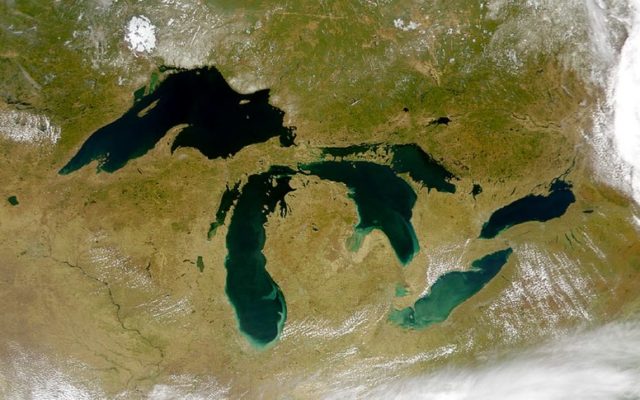Opposition to Canadian Nuclear Waste Storage Site in the Great Lakes Basin Continues

No permanent nuclear waste disposal sites in the Great Lakes Basin. That message continues to resonate with conservationists, Native American tribal nations and members of the U.S. Congress as two new sites for nuclear waste sites have been proposed in Ontario, Canada.
Last year, Canadian power company Ontario Power Generation shut down plans to store low-level nuclear waste at a site in Kincardine, Ontario after a massive public outcry from interests in both the U.S. and Canada. The shut down came not long after the Canadian-based Saugeen Ojibway Nation voted overwhelmingly in a tribal referendum against the plan.
Low-level radioactive waste “comes from reactor operations and from medical, academic, industrial and other commercial uses of radioactive materials,” according to the U.S. Nuclear Regulatory Commission (NRC). Low-level waste is typically short lived.
Now a group of Canadian power companies, called the Nuclear Waste Management Organization (NWMO), is proposing a new storage facility in the Great Lakes Basin to store high-level radioactive waste. High-level waste is “primarily spent fuel removed from (nuclear) reactors after producing electricity.” The proposed sites are located at Ignace, Ontario, about 80 miles from Lake Superior, and South Bruce, Ontario, 26 miles from Lake Huron.
The NWMO site would store around 128 million pounds, or more than 50,000 tons of the waste in an underground facility called a deep geologic repository. High-level waste can remain radioactive for tens of thousands of years.
U.S. Congressman Dan Kildee and 19 other members of Congress have drafted a bipartisan resolution to call on President Joe Biden to ensure the Canadian government does not permanently store nuclear waste in the Great Lakes Basin. Kildee says when American interests considered building a nuclear dump site in the Great Lakes Basin in the 80s, the Canadian government opposed the idea, which ultimately led to it being scrapped. Now, he says, he wants the Canadian government to once again oppose the idea of storing highly radioactive waste in the Great Lakes Basin, the largest source of fresh water in the world.
The Great Lakes supply fresh water to more than 40 million people in the U.S. and Canada. Kildee says a potential disaster at a waste dump site could have devastating consequences. The NRC states “High-level wastes are hazardous because they produce fatal radiation doses during short periods of direct exposure. For example, 10 years after removal from a reactor, the surface dose rate for a typical spent fuel assembly exceeds 10,000 rem/hour – far greater than the fatal whole-body dose for humans of about 500 rem received all at once. If isotopes from these high-level wastes get into groundwater or rivers, they may enter food chains. The dose produced through this indirect exposure would be much smaller than a direct-exposure dose, but a much larger population could be exposed.”
Other organizations are also calling to stop the plan including the Saginaw Chippewa Indian Tribe. Tribal Chief Tim J. Davis says in a statement, “It takes people from all walks of life to ensure we do the good work to protect and preserve our most sacred gift, the gift of water (biish).” He is joined in this sentiment by conservation groups like the Sierra Club and the National Wildlife Federation.
Currently, there are a number of interim disposal sites located around the Great Lakes in both the U.S. and Canada. These sites store around 60,000 tons of high-level radioactive waste. The facilities are maintained, but energy officials say only deep, underground sites are the best solution for long term disposal.
But Kildee says find another place. “Permanently storing nuclear waste in the Great Lakes does not make any sense. The Great Lakes are central to our way of life, and permanently storing nuclear waste so close to our shared waterways puts our economies and millions of jobs at risk in the fishing, boating and tourism industries. People in both in the U.S. and Canada depend on the Great Lakes for drinking water, which could be contaminated if there ever was a nuclear waste incident.”
Kildee says with the sheer size of Canada’s land mass, there must surely be another location far from the largest source of the world’s fresh water to consider.
The Congressional resolution is co-sponsored by Reps. Peter Meijer, R-Grand Rapids; Andy Levin, D-Warren; Jack Bergman, R-Mackinac City; Debbie Dingell, D-Ann Arbor; Anthony Gonzalez, R-Canton, Ohio; Mike Gallagher, R-Green Bay; Bill Huizenga, R-Holland; David Joyce, R-Russel Township, Ohio; Raja Krishnamoorthi, D–Schaumburg, Illinois; Marcy Kaptur, D–Toledo, Ohio; Brenda Lawrence, D-Southfield; Joseph Morelle, D–Irondequoit, New York; Betty McCollum, D–Saint Paul; John Moolenaar, R-Midland; Tim Ryan, D–Warren, Ohio; Jan Schakowsky, D–Evanston; Haley Stevens, D–Rochester Hills; Rashida Tlaib, D-Detroit; Fred Upton, R-Kalamazoo; and Jackie Walorski, R–Elkhart, Indiana.



